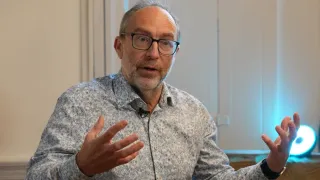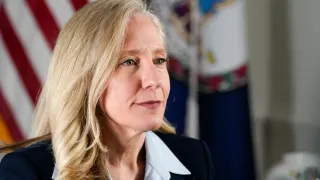July 1, 2014
Nevada Gay Marriage Ban Court Date Set for Sept. 8
Jason St. Amand READ TIME: 2 MIN.
Mickie Kennedy’s “Worth Burning” marks the arrival of a poet who has already spent years earning his place. An award-winning writer, Pushcart Prize nominee, and the author of “Glandscapes,” winner of the Button Poetry Award, Kennedy’s work has appeared in many of the country’s most respected literary journals. Across books and poems, his reputation for emotional candor and meticulous craft has steadily grown.
“Worth Burning,” Kennedy’s first full-length poetry collection, traces a boy’s journey from a violent and unstable Southern childhood through grief, abuse, secrecy, and queerness, and into adulthood shaped by the shadow of the AIDS crisis. These poems burn with confession and clarity, excavating family, desire, and survival without sentimentality or retreat. What emerges is a debut that feels both epic and intimate; brutal, unsparing, and deeply life-affirming.
Michele Karlsberg: How did you approach writing about trauma that is both deeply personal and foundational to the narrative arc of the collection?
Mickie Kennedy: I didn’t set out to write about trauma as a subject. I wrote toward pressure. Toward what kept resurfacing when I tried to write around it. I trusted the body first. Sensation. Scene. Small images, like folding blueberries into batter, that held gravitational significance. It’s difficult to translate sexual assault onto the page without its devastation overwhelming everything. That’s why I let the objects, actions, and settings do much of the speaking.
I didn’t want the book to be defined by a single traumatic revelation. Frankly, I didn’t want the trauma to be a reveal at all. It’s just there, like the foundation of a building, but I’m more interested in the building itself.
“Worth Burning” is a book of arcs, coalescing slowly, poem by poem, until the reader feels the cost of silence before the speaker ever admits it. I wanted the book to feel honest without feeling too exposed, or like a cry for sympathy. The goal wasn’t catharsis. It was clarity.
“Worth Burning” moves across four decades of Southern life, queer identity, and the AIDS crisis. How did you balance the intimate, confessional voice with the broader historical and cultural backdrop?
I never thought of history as something in the background. Whether you invite it or not, history is in the room. It is the room.
When I write from my own specific history, the broader cultural backdrop is already there, shaping the personal. A TV on in the kitchen. A church sign. A tractor rumbling through a tobacco field. I grew up absorbing certain rules before I had language for them. What you could say. What you couldn’t be. Who survived, and who didn’t. Gay boys didn’t. Not usually.
The confessional voice stays grounded by staying specific. Particular bodies. A particular town. One moment. Another moment. I wanted to show how it felt to live through a particular set of circumstances, within a particular span of time.
With the AIDS crisis especially, restraint mattered. I wasn’t trying to write a history lesson. I was trying to translate a pervasive atmosphere of loss. Trying to communicate the fear, confusion, and delayed understanding I experienced, coming of age inside that epidemic.
The mother–son relationship in this book is complex, painful, and intricately rendered. What was the most difficult aspect of writing into that “monstrously confused togetherness,” and what compelled you to go there?
The hardest part: refusing to simplify the mother. It would have been easier to write an uncomplicated villain. But our bond, composed of abuse and care, wasn’t so tidy. The damage and the devotion were tangled. The love didn’t erase the harm. The harm didn’t erase the love, not fully. Holding both on the page, without flinching, took time and patience.
What compelled me to write about this relationship? I had to. It was too massive, central to everything else: queerness, silence, the delay of self. When you grow up too close to someone, you inherit their weather. Their moods become your climate—a climate ruled by volatile shifts.
I wasn’t interested in indictment. I was interested in accuracy. If I’d tried to avoid the confusion, the book would have felt like a lie. I couldn’t talk honestly about growing into myself, late in life, without talking about the woman who taught me to disappear.
You’ve spoken about growing up queer in rural North Carolina. In what ways did returning to that landscape, emotionally and artistically, shape the poems in this collection?
In rural eastern North Carolina, violence was rarely theatrical. It was visible, casual, woven into daily life. An image that comes to mind, from my poem “Snapshot of a Girl Refusing to Smile, 1956”—my young mother squashing caterpillars in tobacco fields, her fingers stained green. The violence was agricultural. Necessary. But still unsettling, spectered by a history of slavery inextricably linked to the Southern landscape. In Maysville, harm was expected, ordinary as the soil. It shaped my every move.
Growing up closeted, I felt hyper-isolated and hyper-exposed at the same time. Everyone knew everyone but no one could be trusted. I was trapped inside a violent house that looked, from the outside, completely unassuming. Always watching, and always being watched. Clamoring to escape with nowhere to go. The claustrophobia was internal and external.
You can feel claustrophobia in the poems themselves, especially the poems that reckon explicitly with the closet. They contain a particular pressure, a vibration—from what they reveal, but also from what they withhold. Silence isn’t empty. It’s charged, electric, almost speech.
The specificity of the Southern geography pushed me towards imagistic precision. Tobacco rows. Burn barrels. Convenience stores filled with Mr. P’s frozen pizza. Details etched in time and memory. In a setting of such exactness, I couldn’t hide behind abstraction. Metaphor couldn’t float free, at least not easily. Maysville insists on accuracy.
Much of “Worth Burning” wrestles with secrets: hidden queerness, concealed violence, unspoken grief. Do you think secrecy can be a generative force in poetry, or is writing a way of breaking out of it?
For a long time, secrecy was a survival skill. I learned how to speak around things. I developed humor, deflection, precision, absurdity, all of which still inflect my present-day language-making. Secrecy creates its own diction, which I tried to channel in a “Mouth of Many Endings,” a poem reckoning with the effects of child abuse. It’s highly lyric. Language on the very edge of sense, straining towards the release of clear speech.
Writing into secrecy isn’t about exposure. It’s not a confessional purge. It’s a renegotiation. On the page, the secret doesn’t disappear. It changes function. No longer a monstrous void of language running the speaker from behind the scenes, it becomes something the writer can finally see, without flinching. And maybe more importantly, the reader can see the secret, too, which opens a particular type of intimacy. It softens the secret, disrupted by community.
Writing “Worth Burning,” it wasn’t my goal to expose everything, a laundry list of family secrets. Instead, I wanted to say just enough, so the silences felt intentional, not imposed. It was difficult, emotionally exhausting, but also empowering. For once, I could decide what was named and what stayed implied. I could choose where the silence belonged.
“Worth Burning” is ultimately about resilience and the long, uneven path toward self-acceptance. What do you hope LGBTQ readers especially those from rural or religious backgrounds take away from this book?
I hope they recognize themselves without being asked to perform bravery or resolution. Many queer stories emphasize escape or triumph. This book doesn’t. It stays with the messier truth of endurance. Of learning how to live inside conditions that don’t want you to exist, and doing so quietly, imperfectly, for a long time.
For readers from rural or religious backgrounds, I hope the book affirms that harm can coexist with attachment. You can love your home and still be wounded by it. You can be shaped by faith and still need to refuse parts of its language. Those contradictions don’t cancel each other out. They are part of the inheritance.
I also hope the book offers permission to tell the truth without cleaning it up. You don’t owe anyone a redemptive arc. You don’t have to forgive to be whole. You don’t have to turn pain into wisdom on demand. Sometimes self-acceptance begins not with understanding, but with refusing to disappear.
If the book gives readers anything, I hope it’s a sense that their survival mattered. That staying alive under pressure is not a small achievement. And that naming what burned you is one way of finally stepping out of its heat.
Michele Karlsberg Marketing and Management specializes in publicity and marketing for the LGBTQ+ community. This year, Karlsberg celebrates 37 years of successful campaigns. www.michelekarlsberg.com






